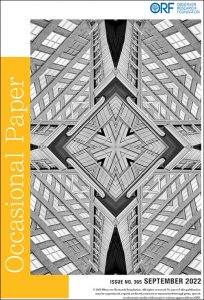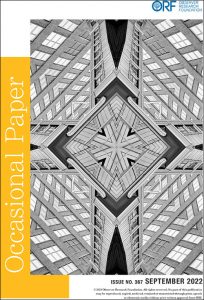Prime Minister Surya Bahadur Thapa's resignation on 7th May 2004 amidst mounting pressure from the agitating five political parties Nepali Congress (NC), Communist Party of Nepal (Unified Marxist-Leninist), Jan Morcha (JM), Nepal Mazdoor Kishan Party (NMKP) and Nepali Sadhavana Party (Ananadi Devi) supported by the members of civil society has left a political vaccum in the country. But Thapa's resignation has not dampened the intensity of demonstrations. The agitating parties have only turned their ire on the Monarchy. By all accounts, the five party alliance have vowed to put pressure on the King to restore the dissolved parliament at the earliest.
The activists of the Nepali Congress (Democratic) led by Sher Bahadur Deuba and activists of the ousted prime minister's Rashtriya Prajatantrik Party have also joined the protest fray and are launching non-violent protest rallies demanding the restoration of dissolved parliament. With the political parties taking the King head-on, the Maoists are enjoying a field day, collecting taxes, extorting money, running parallel governments in some areas, killing civilians, terrorizing government officials and destroying infrastructure etc.
Questionable Royal motive After Deuba's sacking in October 2002, the King has become proactive in Nepali politics. There is a change in the political outlook of the Monarch as he ascended the throne. Now the King is more interested in the restoration of the lost glory of the monarchy. To camouflage his real intent, the King has been appointing weak Prime Ministers --first it was Lokendra Bahadur Chand than Surya Bahadur Thapa. He is now on the lookout for a replacement for Thapa. In the process of forming a new government, the King has set some terms and conditions for the next prime Minister. According to the King's terms, a person with a clean image and one who can unite the political parties under one umbrella and who can hold general election by April 2005, will be best suited for the chair. But given the present fluid political situation in Nepal it is not known how this formula could work in reality. The political parties, sensing hidden agenda are questioning the authority of the King to dictate such terms.
The Kings motives are already questionable at this moment. Instead of finding an early end to the political impasse, the King is busy attending civic receptions. These civic receptions are strategy to build popular public opinion in his favour. During his civic reception programmes, the King makes it a point to speak against the political parties. The King often blames the political parties for bringing the country to this situation. Subsequently, the King is strengthening his position through public opinion and shifting the blame on the political parties. In the continuing five party agitation, the King directly intervened by using repressive measures to put down the protest. Not only did he order the arrest of political leaders he also banned holding of rallies and protests. This is being seen as a direct intervention in the democratic constitutional affairs of the country by the King.
As part of his new tactic the King is bent upon playing 'divide and rule' with political parties. Initially the King was not keen on inviting the political leaders for discussions. But under immense international pressure the King conceded to it, and he invited the leaders for talks. However, the King invited them separately in an effort to split their unity.
In a bid to show their unity the agitating parties refused to meet the King separately. But there were leaders of other political parties, who met with the King separately and discussed with him a viable political solution to the problem. Finally, under immense pressure the King had to take the initiative once again and he called upon the leaders of agitating political parties on May 19, 2004 at his Palace in Nagarjun collectively to find a viable solution. During the meeting with the King the political parties said that the reinstatement of the parliament is the only solution. They even suggested for forming an all party government.
Despite the meeting held between the King and the five party alliance the deadlock did not end as expected. Once again, the King gave separate audience to CPN-UML general secretary Madhav Nepal at the Narayanhiti Royal Palace on May 20, on the pretext of discussing ways to solve the problem. On the same day the King had separate meetings with Nepali Congress president Girija Prasad Koirala. This attitude of the King suggests that he is still interested in pitting one political party against another. For the moment the King's strategy seems to be working out. The leaders of the Nepali Congress and the CPN (UML), the key allies of the five party alliances are at loggerheads over the issue of the consensus candidate for the prime minister's post. There are ample indications that the King is taking advantage of the confusion and may nominate someone who could be entirely from different background for the important post.
Political parties at conflict Political parties in Nepal have a long history of factionalism and splits. Even after the popular movement of 1990, they could not unite themselves for a common cause. Political parties are personality oriented and the leadership is predominantly from the elite section of society. There are different camps around different leaders which occasionally lead to splits within the party. The Nepali Congress split into Nepali Congress (Democratic), the dominant Left parties are divided into various factions and the Rashtriy Prajantra Party (RPP) barely managed to prevent a split thanks to the timely intervention of senior leaders of the party.
Interestingly the political parties stand united in the protest movement against the monarchy, after the fall of Deuba government in October 2002. But they have not been successful to restore the dissolved parliament. Infact the five party agitation against regression seems to be viewed with suspicion. Since December 2003, the student organizations affiliated with the five parties have joined the movement and are quick to question the leadership of their representing parent party.
Apart from factionalism and splits, there is a deep distrust among the leaders of the agitating political parties. They suspect each other's political move or statement. The quest for power has invited a rift between them. The resignation of Thapa government made the parties restive and act individually to secure the post of prime minister. Suddenly, the united parties are going their own ways, caring little for their commitment made to restore democratic principles of the constitution.
Nevertheless, there are several persons in the race for the prime minister's post. Till last year it was Madhav Kumar Nepal of the CPN (UML) unanimously considered as the prime ministerial candidate. Now G.P. Koirala of Nepali Congress also wants to be in the role. The CPN (UML) has gone one step ahead and declared that if not Madhav, they would support either Deuba or K.P.Bhattarai, because both showed their inclination to become the Prime Minister after their recent audience with the King.
The Maoists The Maoists seemed to have lost their identity after the August 2003 peace talks. The din of agitation is so loud that the intensified violence by the insurgents has also been overshadowed. Therefore to make their presence feel the Maoists have changed their strategy.
Recently, the second in command of the CPN (Maoists) Dr. Baburam Bhattarai stated that the Maoists would support the cause of the political parties in the movement. They also talked about a round-table conference with the political parties to end the present deadlock. But at the same time they have intensified violence in a bid to get attention. In March 2004, the Maoists attacked two places, first at Bhojpur district headquarters and within less than a fortnight in Beni Bazaar to destabilize the government. It was indeed a bloody battle in which more than 85 security personnel, 150 insurgents and more than 10 civilians were killed.
Maoists have stepped up violence by killing innocent civilians, political activist and security personnel, they have forcibly abducted hundreds of teachers, students and civilians from various parts of the country to make them participate in their military training and to indoctrinate them in their ideology. They have forced village development committee members to resign from their posts by threatening them of physical action. These threats have resulted in leading to many members of different VDCs to resign. Consequently, once again the Maoists are being reckoned as a strong force posing a challenge for the government.
Similarly, the Maoists are also holding up development activities in Nepal. They have being announcing economic blockades, strikes and very often they extort money from staffs of various international donor agencies. These tactics obviously helps the Maoists to get international attention.
Furthermore, the Maoists intention for peace talks has always been questioned. The peace talks initiated since 2001 did not result to any outcome. In between the Maoists continued their violent activities to pressurize the government. Again in 2003 it seemed that the Maoists are serious of talks and this would result to some fruitful outcome. But some sudden occurrence of incidents, led to collapse of the talks.
Again the Maoists have started talking of peace. On May 16, the Chairman of CPN (Maoists) Puspha Kamal Dahal made a statement that the Maoists are ready to resume talks. But they have put some conditions, Prachanda said they would talk only under the United Nations. Apart from this he reiterated that the King, all the political parties and members of the civil society would have to participate in the talks.
But the Maoists chairman has also hinted and warned that if the political parties as well as the King try to isolate the Maoists, and come to any political settlement would lead to further escalating of violence. Accordingly, through these statements Prachanda wants to prove that the Maoists have not disappeared from the Nepal nor they have become weak.
Conclusion If this political instability continues, there is a fear that this may lead to a total constitutional collapse. The continuing failure of political parties and the King to come to an understandable accord has a potential to snowball into a major controversy.The King's proactive role in the democratic constitutional affairs has already put a question mark on his intentions and contrary to his calculations,the civil society support that the King acknowledges to be in his favour may rise against him. The political parties should also understand the sensitivity of the situation and keep aside their political differences and join hands to look for a possible solution. They should stand for a common cause and not let the nation suffer due to their petty politics. The Maoists, who never tire of talking peace, should show their integrity and display a flexible approach. They should realize that continued political instability and violence may lead to the intervention of external forces. The US has already tagged the Maoists as a terrorist organization and therefore it has been viewing the conflict in Nepal in the context of its global war against terrorism.
* Views expressed in this article are those of the author and do not necessarily reflect those of Observer Research Foundation.
The views expressed above belong to the author(s). ORF research and analyses now available on Telegram! Click here to access our curated content — blogs, longforms and interviews.




 PREV
PREV

